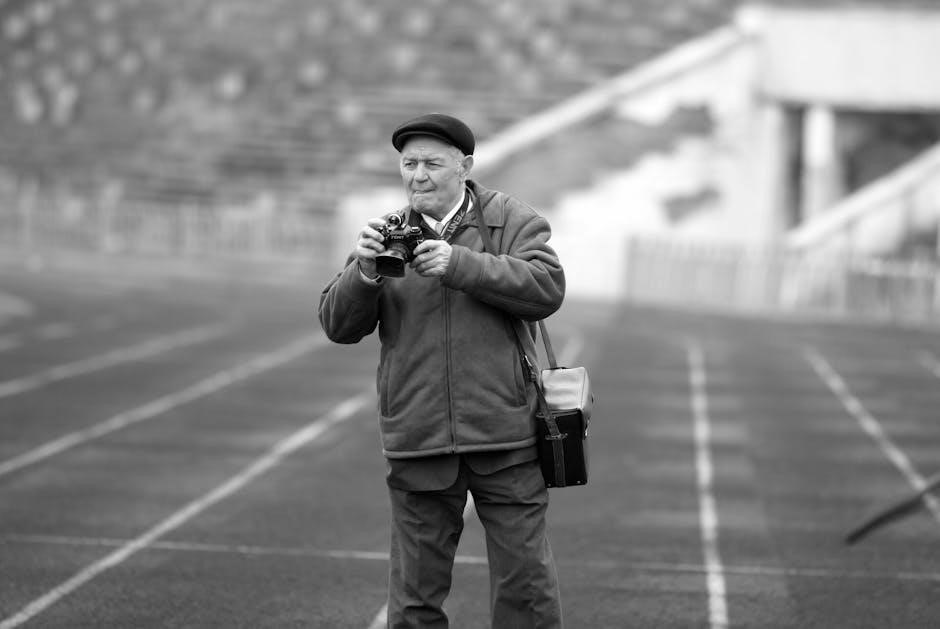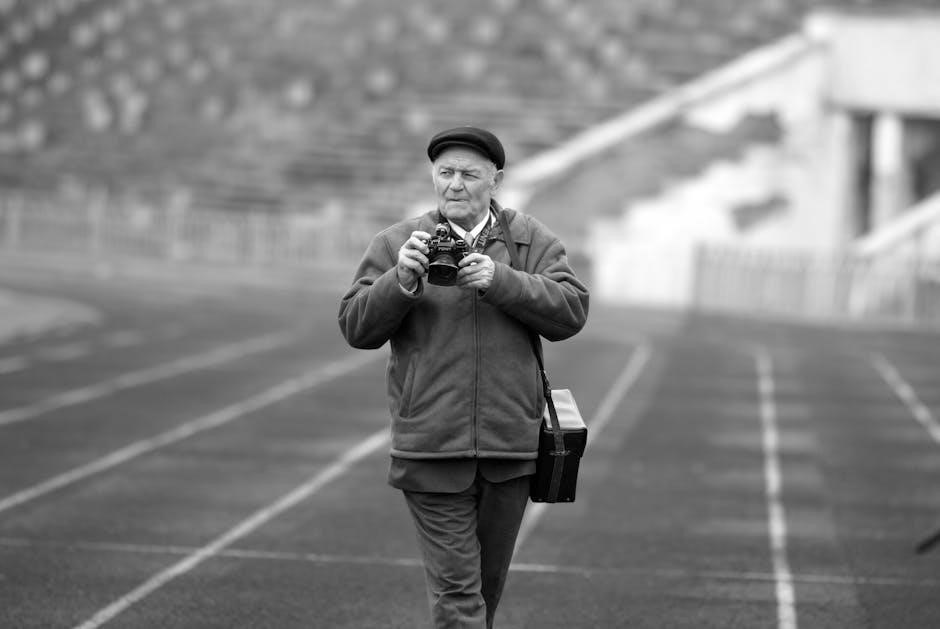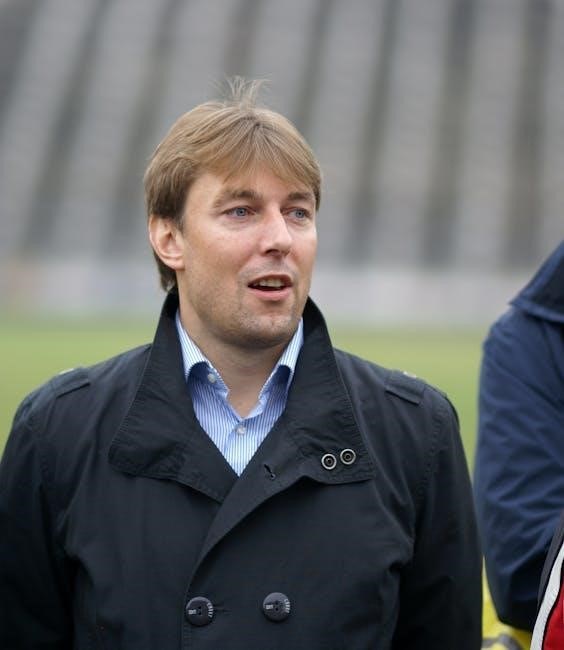The role of deacons in the Black Church is deeply rooted in biblical principles, emphasizing spiritual growth, community service, and leadership. Deacon training manuals provide structured guidance, ensuring deacons are equipped to serve effectively, fostering harmony and stability within the church community.
1.1. What Does It Mean to Be a Deacon?
Being a deacon in the Black Church signifies a divine calling to serve as a spiritual leader and servant. Deacons are entrusted with upholding biblical principles, fostering harmony, and addressing the needs of the congregation. They embody Christ-like character, demonstrating integrity, humility, and a commitment to God and the church. Their role is both sacrificial and transformative, aiming to inspire and support the spiritual growth of the community.
1.2. The Biblical Foundation of Deaconship
The role of deacons is rooted in scripture, with Acts 6:1-7 illustrating the appointment of the first deacons to serve the early church. Biblically, deacons are called to be servants, entrusted with addressing the practical and spiritual needs of the congregation. Key passages like 1 Timothy 3:8-13 outline their qualifications, emphasizing faithfulness, integrity, and a blameless character. This biblical framework forms the cornerstone of deaconship, guiding their ministry and service.
Historical Role of Deacons in the Black Baptist Church
Deacons have historically served as vital servants and leaders, emerging from Acts 6:1-7, ensuring church harmony and addressing community needs, while evolving into key roles in Black Baptist churches.
2.1. The Office of the Deacon in 1 Timothy 3
1 Timothy 3:8-13 outlines the biblical qualifications for deacons, emphasizing dignity, integrity, and faithfulness. Deacons must be men of good character, not given to dishonesty or excessive wine, and committed to their families and the church. This passage serves as the foundation for the role of deacons, highlighting their responsibilities as servants and leaders, ensuring harmony and order within the church community. Understanding these principles is essential for effective deacon training in the Black Baptist Church today.
2.2. Deacons in the Early Christian Church (Acts 6:1-7)
Acts 6:1-7 describes the establishment of the first deacons in the early Christian Church. The apostles, overwhelmed by practical needs, appointed seven Spirit-filled men to serve the community, ensuring fairness and care for all believers. Although not explicitly called “deacons,” their role as servants and problem solvers laid the foundation for the office of deaconship, emphasizing humility, leadership, and service to others. This biblical model continues to inspire modern deacon ministries in the Black Church.

Training and Development for Modern Black Church Deacons
Modern deacon training emphasizes structured programs, biblical principles, and practical applications to equip deacons for effective leadership and service, fostering spiritual growth and community impact.
3.1. Training Methods for Deacons in Today’s Black Church
Training methods for modern Black Church deacons often include structured manuals, biblical teachings, and practical workshops. These programs emphasize leadership development, spiritual growth, and community service. Many churches adopt comprehensive training manuals that outline roles, responsibilities, and expected outcomes. Mentorship programs and hands-on experiences are also integral, ensuring deacons are well-equipped to address contemporary challenges while maintaining traditional values. This holistic approach fosters effective ministry and strengthens church unity.
3.2. The Role of Women Deacons in the Black Baptist Church
Women deacons in the Black Baptist Church play a vital role in spiritual leadership and community service. While traditionally debated, many churches now embrace women in deacon roles, following biblical examples like Phoebe. Their responsibilities include mentoring, teaching, and supporting congregational needs. Women deacons often lead outreach ministries and foster unity, demonstrating their commitment to Christ and the church. Their inclusion enriches the church’s diversity and effectiveness in modern ministry.

Qualifications and Characteristics of Deacons
Deacons must demonstrate dignity, integrity, and self-control, avoiding addictive behaviors. Their commitment to Christ and the church is vital, reflecting strong character and faithfulness in ministry.
4.1. Scriptural Qualifications for Deacons (1 Timothy 3:8-13)
Scripture outlines specific qualifications for deacons, emphasizing dignity, integrity, and self-control. They must not be double-tongued or addicted to wine, managing their households and children faithfully. Deacons should be blameless, demonstrating loyalty to Christ and the church, ensuring their character aligns with biblical standards for effective ministry and maintaining church harmony.
4.2. The Importance of Character, Conduct, and Commitment
A deacon’s character, conduct, and commitment are vital for effective ministry. Biblical standards emphasize dignity, integrity, and self-control, ensuring deacons serve as moral examples. Their conduct must reflect Christ-like behavior, fostering trust and unity within the church. Commitment involves active participation, prioritizing ministry, and maintaining loyalty to the church’s mission. These qualities ensure deacons are spiritual leaders, equipping them to serve faithfully and uphold the church’s values with integrity.

Responsibilities and Functions of Deacons
Deacons serve as problem solvers, preserving church harmony and supporting elders. They assist with community needs, ensuring spiritual growth and fostering unity among members through faithful service.
5.1. Deacons as Problem Solvers and Preservers of Church Harmony
Deacons function as mediators and counselors, addressing conflicts and fostering peace within the church. They support leadership in maintaining order and harmony, ensuring decisions align with the church’s mission and values, while promoting unity and cooperation among members.
5.2. Ministry Expectations and Prioritization of Service
Deacons must prioritize their service, dedicating themselves to the well-being of the church family. They are expected to handle responsibilities with integrity and faithfulness, ensuring their actions reflect biblical stewardship. Training manuals emphasize the importance of placing deacon service above other ministries, fostering a culture of accountability and compassionate leadership within the church community.

Challenges and Opportunities in Deacon Ministry
Deacons face challenges like conflicts and crises but also opportunities to foster unity and growth. Their role in promoting peace and cooperation is vital for church harmony.
6.1. Deacons in Times of Church Crises and Conflicts
Deacons play a critical role in addressing church crises and conflicts, serving as problem solvers and preservers of harmony. They must remain proactive, fostering unity and stability. Training manuals emphasize their responsibility to mediate disputes and provide spiritual guidance during challenging times, ensuring the church remains a beacon of peace and cooperation. Their leadership is essential for navigating conflicts and maintaining a focus on Christ-centered solutions.
6.2. The Role of Deacons in Promoting Peace and Cooperation
Deacons are instrumental in fostering peace and cooperation within the church. Their ministry emphasizes resolving conflicts, mediating disputes, and encouraging unity among members. By modeling Christ-like behavior, deacons create an environment of mutual respect and understanding. Their role in promoting harmony ensures the church remains a place of spiritual refuge and collective growth, strengthening relationships within the church family and community.

Case Studies and Practical Applications
Real-world examples, such as a church embracing women in ordained ministry, demonstrate effective deacon training. Practical manuals and success stories highlight impactful strategies for modern deacon ministries.
7.1. How One Church Embraced Women in Ordained Ministry
A historic Black Baptist church pioneers women’s ordination, appointing its first female deacon. This milestone reflects a growing recognition of women’s leadership roles, fostering inclusivity and empowerment. The church’s journey highlights the importance of re-examining traditions while maintaining biblical integrity, creating a model for others to follow in advancing gender equity within the Black Church.
7.2; Successful Deacon Training Manuals and Their Impact
Effective deacon training manuals provide comprehensive guides for spiritual growth, leadership, and service. They emphasize biblical principles, practical responsibilities, and character development. Manuals often include structured lesson plans, case studies, and individualized service plans. Their implementation fosters consistency, unity, and effectiveness in deacon ministries, strengthening the church’s mission and fostering a deeper commitment to serving the congregation and community with integrity and compassion.

The Relationship Between Deacons and Church Membership
Deacons serve as spiritual leaders and servants, fostering a strong connection with the church family by promoting peace, harmony, and cooperation among members through active ministry and support.
8.1. Deacons as Spiritual Leaders and Servants
Deacons are called to serve as both spiritual leaders and humble servants, supporting the church’s vision and its members. They often assist pastors and elders in ministry, providing guidance and care to the congregation. Through their leadership, deacons foster unity and stability, embodying Christ-like servanthood. Their role is multifaceted, blending spiritual oversight with practical service to the church family.
8;2. Building a Strong Connection with the Church Family
Deacons play a vital role in fostering strong relationships within the church family. By actively listening, empathizing, and addressing members’ needs, they promote unity and understanding. Their presence in times of crisis and their involvement in community activities strengthen bonds. Deacons are encouragers, mediators, and servants, ensuring the church remains a supportive and loving environment for all members to grow spiritually and relationally.

The Role of Deacons in Church Leadership
Deacons serve as spiritual leaders, supporting elders and church staff while fulfilling multi-faceted roles. They are key in maintaining harmony, addressing member needs, and prioritizing service, ensuring the church’s vision is upheld effectively.
9.1. Deacons as Church Leaders and Their Multi-Faceted Role
Deacons are spiritual leaders who support elders and church staff, fulfilling a multi-faceted role. They serve as problem solvers, preservers of harmony, and promoters of peace within the church. Their responsibilities include addressing member needs, resolving conflicts, and collaborating with other leaders to ensure the church’s vision is fulfilled; Deacons also play a crucial role in times of crisis, demonstrating leadership and commitment to the congregation.
- They act as intermediaries between the congregation and church leadership.
- Their role emphasizes service, accountability, and spiritual growth.
9.2. Working in Partnership with Elders and Church Staff
Deacons collaborate closely with elders and church staff to fulfill the church’s mission. This partnership ensures harmony and effectiveness in ministry, with deacons addressing practical needs while elders focus on spiritual leadership. Clear communication and mutual respect are essential for this collaboration, fostering a unified approach to serving the congregation and advancing the church’s vision.
- Teamwork between deacons and church leaders strengthens overall ministry impact.
- Shared goals and responsibilities promote a cohesive church environment.

The Importance of Annual Commitment and Accountability
Annual commitment ensures deacons remain dedicated to their role, while accountability maintains integrity and effectiveness in ministry. Regular evaluations and renewals of service foster spiritual growth and church impact.
10.1. Maintaining Active Status as a Deacon
Maintaining active status as a deacon requires annual commitment and demonstration of service dedication. Deacons must prioritize their role, ensuring it remains a primary focus amidst other ministries. This accountability ensures continued effectiveness and alignment with the church’s mission, fostering a dedicated and reliable leadership presence within the congregation.
10.2. Evaluating and Renewing Deacon Ministries
Evaluating deacon ministries involves regular assessments of their effectiveness in serving the church. Annual reviews ensure accountability and alignment with the church’s mission. Feedback is used to strengthen their roles, while renewal processes help deacons adapt to changing needs. This ensures ministries remain vibrant, relevant, and impactful, fostering continuous growth and dedication among deacons in their spiritual and communal responsibilities.
Deacon training in the Black Church has evolved significantly, adapting to modern challenges while staying rooted in biblical principles. Future efforts will focus on equipping deacons for the 21st century, ensuring their ministries remain impactful and relevant.
11.1. The Evolution of Deaconship in the Black Church
Deaconship in the Black Church has undergone significant transformation, blending biblical roots with cultural and societal needs. From its early role in addressing community concerns to modern adaptations, deaconship continues to evolve, embracing inclusivity and diverse ministries while maintaining its core mission of service, spiritual leadership, and fostering unity within the church community.
11.2. Equipping Deacons for the 21st Century
Modern deacon training emphasizes equipping deacons with skills to address contemporary challenges, fostering spiritual growth, and promoting unity. Training manuals and resources focus on servant leadership, cultural relevance, and collaboration with church leadership. By blending traditional values with innovative approaches, deacons are empowered to effectively serve their congregations and communities in an ever-changing world.
